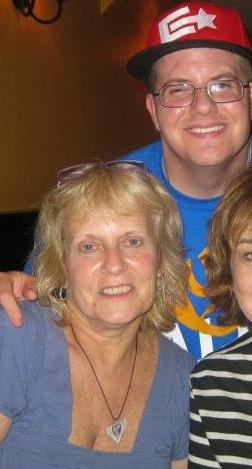Declaring her love, mother given 20 years for killing son
Mother and son: Tracey Zetzsche was sentenced to 20 years in prison on Nov. 1 for the killing, of which she has no memory, of her son, Gabriel Philby-Zetzsche who had cerebral palsy. This picture, from Philby-Zetzsche’s Facebook page in August 2012, show Zetzsche, with her son, during happier times.
ALBANY — Told that she brutally took her son’s life, Tracey Zetzsche accepted her sentencing on Nov. 1 as she recalled not how he died, but how much she loves him.
Zetzsche, 53, was sentenced to 20 years in prison for first-degree manslaughter based on extreme emotional disturbance, reduced from second-degree murder after both parties in the case determined she had legitimate amnesia, unable to remember any of the facts surrounding the killing of 22-year-old Gabriel Philby-Zetzsche by knives to his heart and a hammer to his skull. From July 26 to 30 during the summer of 2012, his body remained on the floor of their Westerlo apartment.
Judge Stephen Herrick described the “horrific nature” of the injuries to Philby-Zetzsche and said that evidence showed his mother tried to remove signs of his murder. The bloodied tools were wrapped and put in a Dumpster; Zetzsche was reported to have requested water for mopping, and had pointed fans out the apartment window.
One of the two kitchen knives used in the killing was bent, and DNA on the tools was matched with both Zetzsche and her son. Herrick said there were over 30 lacerations on Philby-Zetzsche’s body.
“I apologize, Gab,” Zetzsche said in court, concluding her comments during the sentencing. “I failed you. I'm so sorry.”
Herrick gave Zetzsche the top of the 18- to 20-year range allowed by the plea bargain. The Alford plea used is not a direct admission of guilt, but concludes the evidence against the defendant would likely result in conviction. Zetzsche would have faced 25 years to life had she been convicted of second-degree murder. Five years of post-release supervision are included in her sentencing, for which she will be in state prison.
“Sometimes in close relationships, things happen that become very emotional and result in extreme violence, and I don't know exactly what triggered the events that caused Gab’s death,” Herrick said at the sentencing. “What I do know is that all of the evidence indicates that you were the cause of Gab’s death, and I know the pain that you have suffered, do suffer, and will suffer for the rest of your life as a result of what you have done.”
James Milstein, Zetzsche’s court-appointed lawyer, told The Enterprise that no MRI (Magnetic Resonance Imaging) had been performed on Zetzsche in her psychiatric evaluations. Psychiatrists spoke to her, he said, and reviewed her medical records.
“If I were involved in the case, I would say to the prosecutor, if she had not had an extensive MRI of the brain performed, it would be a negligent evaluation,” Dr. Robert P. Granacher told The Enterprise in September, after the plea hearing cited Zetzsche’s amnesia. Granacher is a University of Kentucky professor of clinical psychiatry who conducts neuropsychiatric evaluations in private practice and serves as a medical witness in trials. He also said tests of memory function and symptom validity tests should have been conducted.
During the plea hearing in September, the prosecution presented text messages from Philby-Zetzsche to a family friend, describing his mother as suicidal, wanting to be with her deceased parents.
Milstein told The Enterprise that the defense proposed a plea of not guilty by reason of a mental disease to the prosecution, but it was opposed.
“The other option would be to proceed with a defense of not guilty by reason of a mental disease and, if convicted and found not guilty, she would then be confined in a mental hospital for an indefinite period of time,” said Milstein, referring to a dissociative disorder as her illness.
In requesting the lowest sentence of 18 years, Milstein, an Albany County public defender, submitted a sentencing memo.
“The idea that she deserves to be in prison, as opposed to a psychiatric facility, where many of her issues could be more appropriately treated, are questioned by many,” wrote Milstein. “Nevertheless, Tracey has made this decision to move forward with the plea bargain as her attempt to obtain closure. She presents a case where justice is elusive and impossible to fashion. The Court should exercise appropriate compassion for a broken woman who will spend the rest of her days knowing that her body caused the death of her beloved son, while her mind was elsewhere.”
The defense also submitted letters from family members to the court. Two letters were read by the prosecution. One, from Philby-Zetzsche’s father, Richard Zetzsche, who had left his wife and child soon after Gab was born, called the murder “satanic” and “sadistic.”
“I recently resigned from my position as a tractor-trailer driver due to the emotional impact of this tragedy,” the prosecution read from a letter by Philby-Zetzsche’s father.
“Whatever happened on that hot summer night was not the Tracey I have known and loved since we were kids,” read a letter from Zetzsche’s brother, Ted Philby. “I wish I loved my children as much as she loves Gab.
“Gab grew to hate his father in his older years,” wrote Philby. “He refused to visit him. He told us his father treated him, and I'm quoting Gab, ‘like crap and called me the Devil’s child.'”
Zetzsche said at the sentencing her son had a brain hemorrhage as a premature baby, born with a twin sister, Alicia; he had cerebral palsy, hydrocephalus, learning disabilities, behavioral problems, and he suffered from seizures.
“A hundred and two days later after his birth, with much prayer and God's grace, I brought my son home with the help of my family,” Zetzsche said. “Gab’s father abandoned us shortly after Gab was born and his sister died.”
The mother and son had rented an apartment in Westerlo over the P & L Deli on Route 143 for almost a year; they were originally from Commack, Long Island. Zetzsche worked as a chambermaid at Hilltown hotels and struggled to pay rent, people who knew her told The Enterprise at the time of the murder. They also spoke of how close she was to her son.
“To me he was perfect,” Zetzsche said in court. “He was a gift from God, but Gab was never really comfortable with his own skin. He longed to be normal. He longed to be accepted.”



